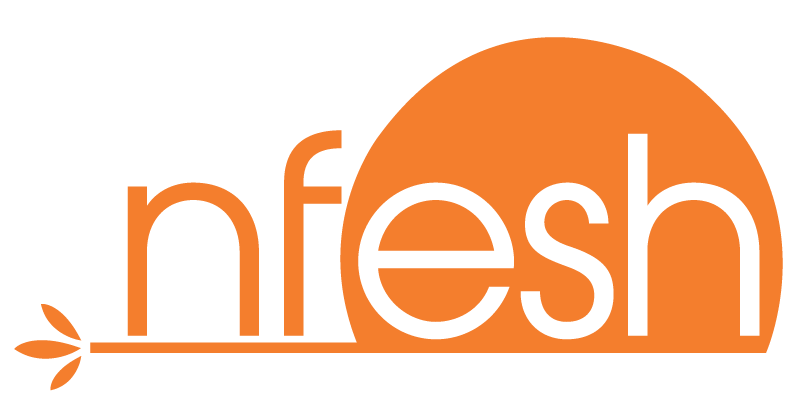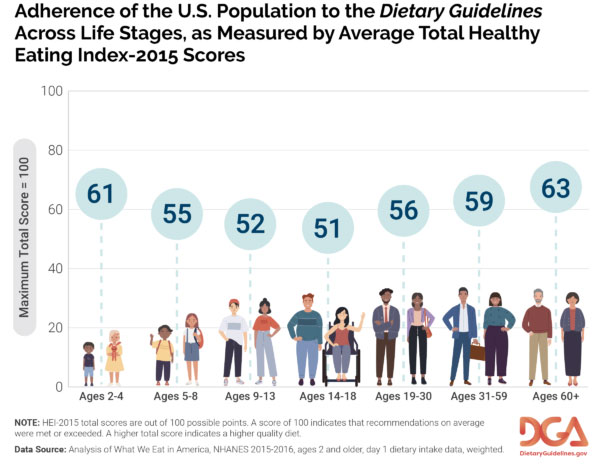At the end of last month (and last year) the Ninth Edition of the Dietary Guidelines for Americans – this one for 2020-2025 – was released. It happened, as it generally does, with little fanfare and public acknowledgement. That does not mean, however, that these findings and recommendations are and were unimportant. In fact, we at NFESH believe that these current guidelines may be more important than ever – given the context in which they were published. Yes, we mean COVID, that inescapable position in which all of us find ourselves, regardless of geography, age, race, economic status or gender.
The coronavirus has touched us all in one way or another, and it continues to do so. As we look back as well as forward, we see food as a “common denominator”. What do we mean, you may be asking. Isn’t food always that? Isn’t it, along with shelter and clothing, universally acknowledged as a necessity of life? Yes, of course. But we think the pandemic has subtly altered our relationship, if we can call it that, with food; and we think that acknowledging and taking a look at that change will be both interesting and helpful.
If we think back almost a year now, we can remember that toilet paper and disinfectants weren’t the only commodities that were scarce on grocery store shelves. Food was too, and shoppers waited outside stores for hours for the opportunity to enter and grab almost anything they could from rapidly emptying shelves. Those queues were a novel version of “food lines,” but the conventional types were growing too. Large and growing groups of people who had traditionally relied on food kitchens for meals continued to do so. At the same time, other individuals — like the millions of workers who had lost employment and paychecks, as well as seniors whose regular sources of meals were at least temporarily closed –lined up in cars for miles and waited for hours to receive bags and boxes of donated food items.
Fortunately, at least some of those conditions have improved. The supply chain has largely bounced back and grocery stores are near full again. Food lines at least seem shorter. Some economic relief has been granted and more, in one form or another, may be on the way. But one thing has not changed, and that is where the importance of the Dietary Guidelines can and do come in. Many Americans’ eating habits seem to have been transformed by this global experience — and not for the better.
We do not have what is considered empirical proof of this assertion; but our careful observations, on-going conversations with friends and family, and even our own eating behaviors during this last year give credence to the belief that typical American diet has grown less healthy as the pandemic has persisted. As a society we seem to be eating less nourishing foods, less nutritionally-balanced meals, less regularly, or just lesser amounts of food in a given 24-hour period. That means less attention to our health and well-being than we owe ourselves.
Both the full Dietary Guidelines and a simple 4-pronged “make every bite count” summary can be easily accessed and downloaded at https://www.dietaryguidelines.gov. We encourage you not only to read the summary but also to heed the simple recommendations … as though your health might depend on it. Because it does.
As one last word we’d like to acknowledge the good news that seniors actually ranked the best of all age groups in the Healthy Eating Index Score. As a group older Americans age 60 and older scored 63. That’s a critical advantage over those 19 to 30 who scored 56 and those 31-59 who attained a mark of 59.
This is proof positive that some things really can improve with age – and in this case our personal choices have lots to do with ensuring that. A 63 might not just be good; it is better than the others. But there remains a great deal of room for improvement if seniors want to be at their best as far as nutritional health is concerned. It doesn’t require a doctor’s prescription to get there. There is no bitter pill to swallow. It’s all about choice and personal commitment. “Make every bit count” clearly charts the way.

